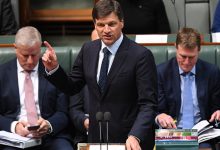Federal energy and emissions reduction minister Angus Taylor has told a meeting of G20 energy ministers that Australia was doing its part to help stabilise global energy markets – by buying more oil.
In a speech to the meeting of energy ministers via video conference, Taylor said that Australia was responding to the recent crash in oil prices – which is already causing the delay of more than $80 billion in Australian LNG projects – by increasing oil reserves to help demand for the fossil fuel to recover.
Australia, of course, is predominately a buyer of oil, importing almost all of the oil used locally, and is largely a beneficiary of lower prices. The fact that it is intervening in the markets by promising to buy more, and so push the price up, is an interesting intervention.
It also highlights the priorities of the Morrison government, agreeing to stimulate demand for a fossil fuel, and so far ignoring the multiple calls to push for greater independence from fossil fuels by encouraging the investment in more clean energy sources and the increased adoption of electric vehicles.
“Australians rely on energy availability at sustainable, affordable prices without unnecessary volatility. This is a strong focus for our government,” Taylor told the meeting.
“We believe that action needs to be taken to address current excess supply. We are committed to open and transparent global energy markets. We believe there is a need to take action to stabilise oil markets at supply and price levels that support ongoing investment, supply diversity and energy security.”
“By showing solidarity today, I hope we can ease market volatility and restore confidence. We will send the signals for continued investment to maintain energy security and affordability.”
The joint statement released by the G20 energy ministers following the meeting makes no reference to clean energy technologies, or the need to transition to zero emissions sources of energy, but instead discusses the need to address “energy market stability” as an indirect reference to recent oil price volatility.
Global oil prices have plunged by more than 50 per cent since the start of the year, driven primarily by a supply war kicked off between Russia and OPEC countries, with both sides ramping up production to challenge the sustainability of production.
The oil price war has been exacerbated by falls in global oil demand as a result of a slowing global economy caused by the Covid-19 pandemic.
The supply war triggered the intervention of G20 energy ministers, who saw the impact on oil prices as unsustainable, and threatened the viability of supplies in third-party countries including the US, Canada and Brazil.
It was with these traditional Australian allies, in the United States and Canada, that Taylor sought to “show solidarity” in the need to bolster demand for oil and provide price support.
With little regard to the need for increased investment in zero emissions technologies, energy ministers responded to a call from the International Energy Agency head Fatih Birol for countries to boost oil demand in an attempt to avoid a wider collapse of the industry.
The fossil fuel industry feared that the slow oil prices would push some producers out of the market, seeing higher priced unconventional oil supplies being produced as a loss.
Energy ministers agreed to push for a resolution to the oil price war by increasing demand for oil, while major producers have reached a truce, also agreeing to cut back production.
Taylor pointed to the deal being negotiated between Australia and the United States to share access to the US strategic petroleum reserves as part of Australia’s efforts to bolster its supplies.
“I note the IEA’s call for some countries to buy oil to support demand. Australia has already been advancing a program to enhance our oil reserves prior to the COVID-19 pandemic, ” Taylor said.
“I can confirm that Australia is well progressed with this work and is seeking to finalise commercial terms now. The recently-agreed Australia-US Strategic Petroleum Reserve Arrangement places Australia in a good position to build up strategic reserves.”
“This arrangement will enhance not only Australia’s domestic fuel security by bolstering our stockholdings, but will also assist supporting the global oil market during this challenging time,” Taylor added.
Taylor said that it was crucial that Australia plays a role in ensuring that global oil supplies remain economically sustainable, again indicating that the Morrison sees a long term need for the oil industry and will move to help push oil prices back to historical levels.
“We want to see all players behave in a fair and sustainable way so action can be taken to address the significant levels of global oil supply,” Taylor said.
“Australia is committed to open and transparent global energy markets and the price of oil is clearly an important factor in this. We need to help markets to return to equilibrium, at price levels that provide signals for ongoing investment globally and here in Australia.”
The move comes as major LNG projects planned for Australia have been put on pause as oil prices drive down the international market for gas.
Many gas contracts in the Asian region, including the Asian gas spot price, are pegged to a global oil price benchmark, so the sudden drop in oil prices as had a corresponding impact on the viability of new gas projects targeting the international market.
As much as $80 billion in Australian LNG projects have been delayed as a result of the combined economic impacts of the Covid-19 pandemic and the oil price war.
RenewEconomy and its sister sites One Step Off The Grid and The Driven will continue to publish throughout the Covid-19 crisis, posting good news about technology and project development, and holding government, regulators and business to account. But as the conference market evaporates, and some advertisers pull in their budgets, readers can help by making a voluntary donation here to help ensure we can continue to offer the service free of charge and to as wide an audience as possible. Thankyou for your support.








